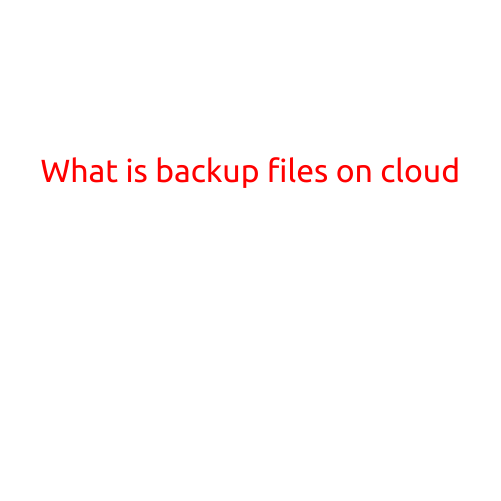
What is Backup Files on Cloud?
In today’s digital age, data loss is a nightmare that can happen to anyone at any time. A single power outage, hardware failure, or accidental deletion can wipe out valuable files and documents, causing untold stress and inconvenience. However, with the rise of cloud technology, backup files on cloud have become a reliable and convenient solution to mitigate data loss risks.
What are Backup Files on Cloud?
Backup files on cloud refer to digital copies of your important files and data that are stored in a remote location, accessible over the internet. By storing your files in the cloud, you can ensure that they are protected from physical damage, theft, or loss, and can be easily restored in case of a disaster.
How Do Backup Files on Cloud Work?
Backup files on cloud work by sending your files to a third-party cloud storage provider, such as Google Drive, Dropbox, or Microsoft OneDrive, through the internet. The provider then stores your files on their servers, which are typically located in multiple data centers around the world.
When you need to access your files, you can log in to the cloud storage provider’s website or mobile app and download them to your device. Many cloud storage providers also offer features such as:
- Automatic Backup: This feature allows you to set up automatic backup schedules to ensure that your files are regularly updated and backed up.
- Versioning: This feature allows you to track changes to your files and restore previous versions if needed.
- Collaboration: Multiple users can collaborate on the same files and documents in real-time.
- Data Encryption: Files are encrypted during transmission and storage to ensure secure access.
Benefits of Backup Files on Cloud
There are several benefits to using backup files on cloud, including:
- Convenience: You can access your backed up files from any device with an internet connection.
- Scalability: Cloud storage providers offer scalable storage solutions, allowing you to increase or decrease storage capacity as needed.
- Security: Cloud storage providers have advanced security measures in place to protect your files from unauthorized access.
- Cost-Effective: Cloud storage can be more cost-effective than traditional backup solutions, such as magnetic tapes or external hard drives.
- Peace of Mind: Knowing that your files are backed up in the cloud can give you peace of mind, allowing you to focus on other important tasks.
Common Use Cases for Backup Files on Cloud
Backup files on cloud are commonly used for:
- Business Data: To protect important business documents, financial data, and customer information.
- Personal Files: To back up personal files, photos, and videos to prevent data loss.
- Large File Collections: To store and backup large file collections, such as videos or audio files.
- Collaborative Projects: To collaborate on projects with team members located remotely.
Conclusion
Backup files on cloud have revolutionized the way we think about data backup and storage. With the ability to store and access files from anywhere in the world, using cloud storage solutions has become a crucial part of digital data management. By understanding what backup files on cloud are, how they work, and their benefits, you can ensure that your valuable data is safe and secure.





